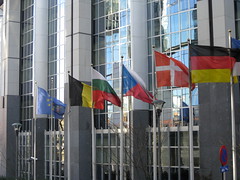 For a week last month, a group of young leaders from two continents, the United States and Europe, shared excitement and disappointments in the complex tapestry that constitutes Atlantic relations. The conclusion? Soft-power and regular exchanges are the only way a true condominium can develop.
For a week last month, a group of young leaders from two continents, the United States and Europe, shared excitement and disappointments in the complex tapestry that constitutes Atlantic relations. The conclusion? Soft-power and regular exchanges are the only way a true condominium can develop.
The forum was a weeklong lecture series the United States Meets Europe, organized by the Institute for Cultural Diplomacy based in Berlin. It took place in Washington and New York as part of the Forum for Young Leaders program, focusing on themes of soft power, cultural diplomacy and American foreign policy.
Who better to discuss relations between the United States and Europe than future leaders of the two continents? Students and young professionals from both sides of the Atlantic, many having studied or previously worked in the U.S. and EU, came together to focus on the need to differentiate between their two regions—each vastly differing in their respective expectations. Possessing a breadth of experiences and viewpoints, participants delved into these topics in order to better understand diplomatic outlooks on the two continents.
Throughout the week, speakers shared various viewpoints and observations on the current state of American and European affairs. There was broad agreement that both continents hold common views on such values as democracy and human rights, but that specific interests are not always aligned and agendas often differ. The complex tapestry of the European Union can lead to additional difficulties in the transatlantic relationship. President Obama announced that he would not be attending the May 18 Madrid Summit, leaving many European politicos disappointed by the decision. Expectations of the American president run high, but the lack of a consolidated voice in the EU leads to confusion when working to express these expectations. The result is ambiguity and frustration.
The result of the 2010 Copenhagen Summit was another disappointing example of this divergence of interests. Many took the fact that no binding commitments made during the summit indicated a significant missed opportunity in climate change legislation. The fact that the United States was not willing to follow the EU agenda illustrates that when Europe and the United States have not arrived at a consensus, it can be very difficult to find a satisfactory compromise. While climate change is a central matter in Europe both politically and domestically, it is not necessarily the case in the United States, where issues such as the war in Afghanistan, domestic universal health care, and unemployment are more relevant at the moment.
How can countries sharing disparate foreign policy views improve cultural understanding to build solid partnerships? The divergence of interests and viewpoints are to be expected and shouldn’t be seen as major roadblocks to future relations as long as there is continuous dialogue and faith in a sincere partnership between the United States and Europe, the delegates concluded. Nonetheless, public opinion is an important element of any international relationship. For this reason, cultural democracy is essential. Visits to National Public Radio and the Kennedy Center in Washington D.C. gave participants an opportunity to see how these types of institutions are important in broadcasting their cultural identities internationally. Although it is difficult to measure results of improved cross cultural understanding, this ''soft power'' seems to be essential in the consolidation of the US-EU relationship.
The United States and Europe depend on each other to make a determinant impact on global issues. As in any long-distance relationship, bonds can be strengthened only if the visits are frequent and the daily communications are effective.